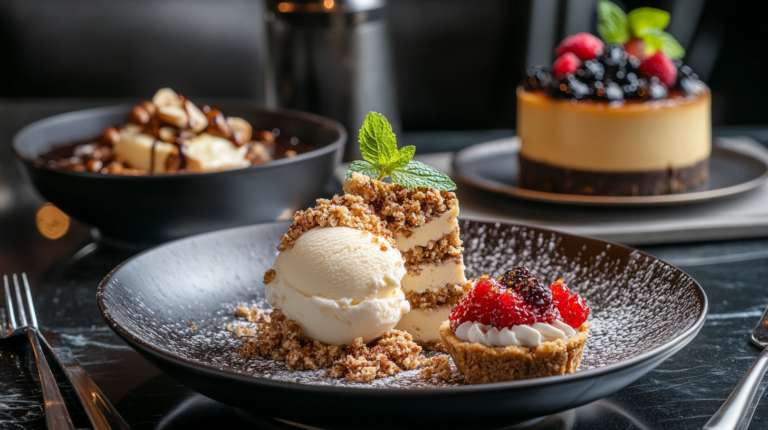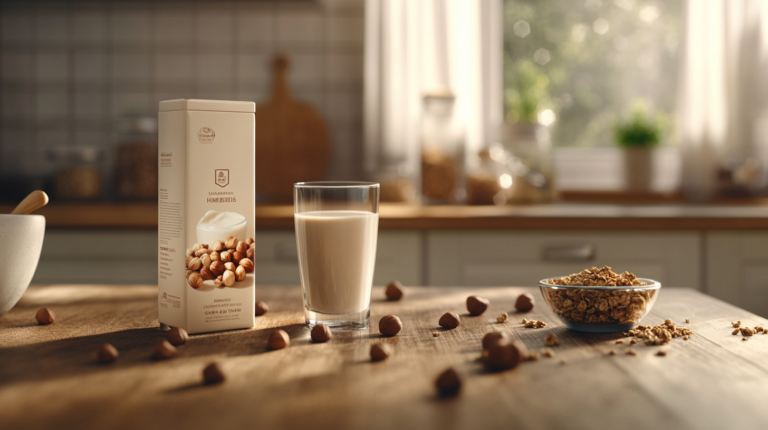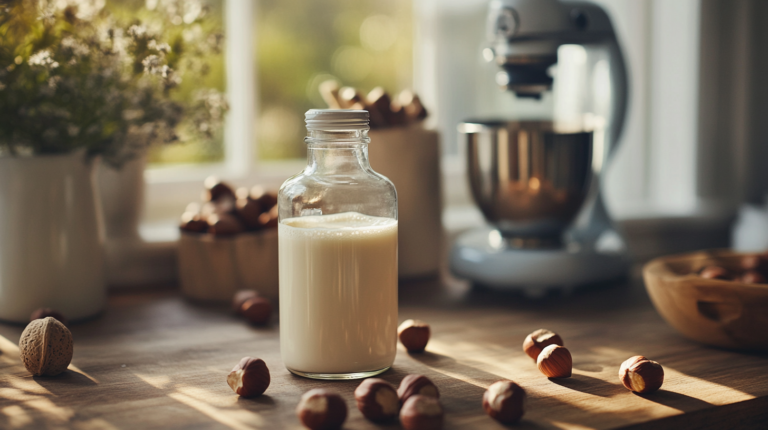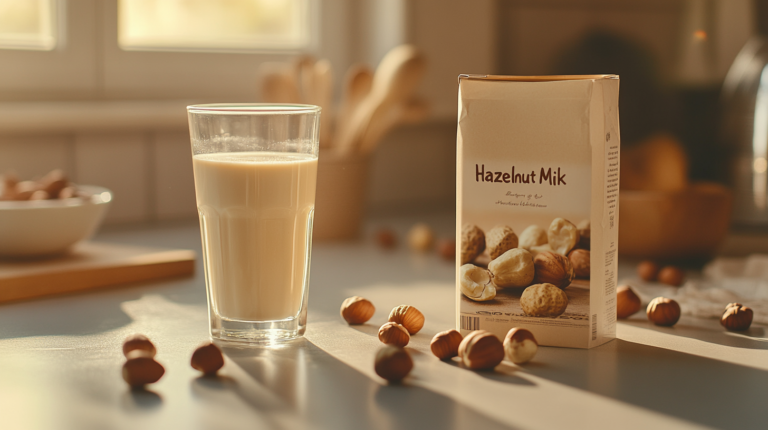Does Hazelnut Syrup Really Contain Hazelnuts? The Surprising Truth!
The alluring aroma and rich, nutty flavor of hazelnut syrup have made it a popular addition to coffee drinks, desserts, and cocktails. But have you ever wondered if this delectable syrup actually contains real hazelnuts? Let’s dive into the surprising truth behind hazelnut syrup and explore its ingredients, production methods, and alternatives.
The Composition of Hazelnut Syrup
Hazelnut syrup is primarily a flavored simple syrup, which means it’s based on a mixture of sugar and water. However, the hazelnut flavor can be introduced in various ways, and not all of them involve actual hazelnuts.
– Traditional Hazelnut Syrup
In its most authentic form, hazelnut syrup does indeed contain real hazelnuts. The traditional recipe calls for a combination of water, sugar, and hazelnuts. Typically, the standard measurements include:
- 200 grams (1 cup) of sugar
- 240 milliliters (1 cup) of water
- 100 grams (3.5 ounces) of hazelnuts
The hazelnuts used in this recipe are preferably roasted to enhance their flavor profile. Roasting can be done at home by toasting the nuts in an oven at 180°C (350°F) for 10-15 minutes until they become fragrantly golden.
– Commercial Hazelnut Syrups
While some high-quality commercial syrups may use real hazelnuts, many mass-produced versions rely on artificial or natural flavorings to achieve the hazelnut taste. This is often done to reduce costs, extend shelf life, and maintain consistency in flavor across large batches.
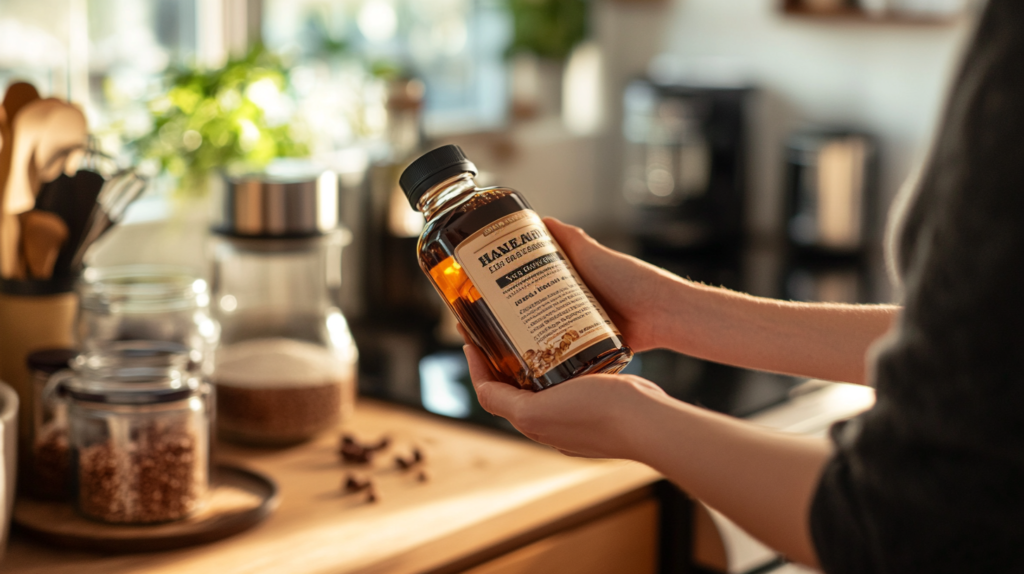
The Truth About Ingredients
The ingredients in hazelnut syrup can vary significantly depending on the brand and production method. Let’s examine some common components:
– Natural Hazelnut Flavoring
Many commercial syrups use natural hazelnut flavoring instead of actual hazelnuts. This flavoring is derived from hazelnuts but is more concentrated and easier to work with in large-scale production.
– Artificial Flavoring
Some lower-quality syrups may contain artificial hazelnut flavoring, which is chemically synthesized to mimic the taste of hazelnuts without using any nut-derived ingredients.
– Hazelnut Extract
Hazelnut extract is a concentrated form of hazelnut flavor that can be used in place of whole nuts. It’s often added to syrups in small amounts (1-2 teaspoons or 5-10 ml) to provide a strong hazelnut taste without the need for straining.
– Other Ingredients
Commercial syrups may also contain additional ingredients such as:
- Preservatives to extend shelf life
- Coloring agents to achieve a consistent appearance
- Thickeners or stabilizers to improve texture
The Production Process
The method of producing hazelnut syrup can significantly impact whether real hazelnuts are used and how they’re incorporated.
– Homemade Hazelnut Syrup
When making hazelnut syrup at home, you have full control over the ingredients. The process typically involves:
- Combining sugar and water in a saucepan
- Heating the mixture until the sugar dissolves
- Adding chopped or whole hazelnuts
- Simmering the mixture to infuse the hazelnut flavor
- Straining out the solid nut pieces
- Cooling and bottling the syrup
This method ensures that real hazelnuts are used, resulting in an authentic flavor profile.
– Commercial Production
Large-scale production often prioritizes efficiency and consistency. Commercial manufacturers may use one of the following methods:
- Flavor Infusion: Similar to the homemade method, but on a larger scale. This may involve using real hazelnuts in the initial stages of production.
- Flavor Addition: Adding natural or artificial hazelnut flavoring to a simple syrup base. This method is more common in mass-produced syrups.
- Extract Blending: Mixing hazelnut extract with a sugar syrup base, which provides a strong flavor without the need for whole nuts.
The Impact on Flavor and Quality
The use of real hazelnuts versus flavoring agents can significantly affect the taste and overall quality of the syrup.
– Authentic Hazelnut Flavor
Syrups made with real hazelnuts often have a more complex, nuanced flavor profile. They may offer subtle notes of roasted nuts and a natural sweetness that artificial flavorings can struggle to replicate.
– Consistency and Shelf Life
Commercial syrups using flavorings or extracts tend to have a more consistent taste across batches and a longer shelf life. However, they may lack the depth of flavor found in syrups made with whole nuts.
– Nutritional Considerations
Syrups containing real hazelnuts may offer some nutritional benefits, as hazelnuts are rich in vitamins, minerals, protein, fiber, and healthy fats. However, the high sugar content of the syrup means these benefits are minimal.
Alternatives and Variations
or those interested in the versatile uses of hazelnuts, from culinary applications to innovative products, explore the all-around uses of hazelnuts in food and beyond to discover creative ways to enjoy this nut.:
– Hazelnut Cream
Products like Hazel Reàl offer a cream-based hazelnut flavoring that can be used in cocktails, coffees, and desserts. These often contain real hazelnut infusions for an authentic taste.
– Organic Options
Some brands, like Monin, offer organic hazelnut syrups made with organically grown cane sugar and natural flavors. These products cater to consumers looking for cleaner, more natural ingredients.
– Sugar-Free Versions
For those watching their sugar intake, some manufacturers produce sugar-free hazelnut syrups using artificial sweeteners to mimic the sweetness of traditional syrups.
– Making an Informed Choice
When selecting a hazelnut syrup, consider the following factors:
- Ingredient List: Check the label for real hazelnuts or natural hazelnut flavoring if authenticity is important to you.
- Intended Use: For cooking or baking, syrups with real hazelnuts may provide better results. For beverages, flavored syrups might suffice.
- Dietary Restrictions: If you have nut allergies, be cautious with syrups containing real hazelnuts and opt for artificial flavorings instead.
- Quality vs. Convenience: Homemade syrups offer control over ingredients but require more effort. Commercial syrups are convenient but may compromise on authenticity.
- Price Point: Syrups made with real hazelnuts are often more expensive due to the cost of the nuts themselves.
Conclusion
The surprising truth about hazelnut syrup is that it doesn’t always contain real hazelnuts. While traditional and high-quality syrups often do include actual nuts, many commercial versions rely on natural or artificial flavorings to achieve the hazelnut taste. Understanding the differences in ingredients and production methods can help you make an informed choice based on your preferences for flavor, quality, and dietary needs.
Whether you opt for an authentic syrup made with real hazelnuts or a flavored alternative, hazelnut syrup remains a versatile and delicious addition to a wide range of beverages and culinary creations. By being aware of what’s really in your syrup, you can better appreciate its flavor and make choices that align with your taste preferences and health considerations.
Sources:
[1] https://www.cocktailogy.com/hazelnut-syrup/
[2] https://www.realingredients.com/product/hazel-real/
[3] https://coffeecopycat.com/hazelnut-syrup/
[4] https://www.lamaisonfrancaise.com/en/cave/1301-sirop-brut-noisette.html
[5] https://monin.us/products/organic-hazelnut-syrup
[6] https://www.torani.com/hazelnut-syrup.html


